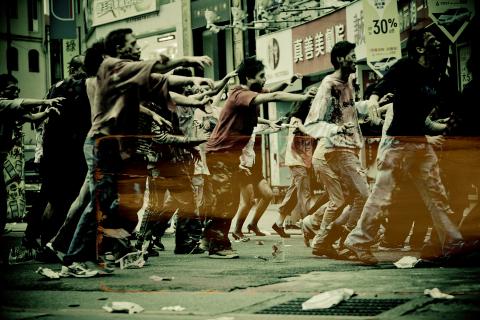Billed as the very first Taiwanese zombie movie, Zombie 108 (棄城Z-108) has generated lots of buzz among horror aficionados both at home and abroad. Nearly 900 people reportedly answered director Joe Chien’s (錢人豪) call to invest in the flick, whose budget clocked in at around NT$10 million. Later, two important players in the genre circuit, the Brussels International Fantastic Film Festival and Puchon International Fantastic Film Festival, picked the movie as part of their lineups this year.
With a more than adequate beginning that recalls many blockbusters of its kind, the self-proclaimed horror B-movie gets off to a good start. Yet the momentum soon dissipates as the movie struggles to flesh out its story.
The film starts with a familiar premise. There is a virus breakout, which is suggested in a sketchy opening sequence. And the next thing we know, Ximending becomes a zombie-infected neighborhood under quarantine. A SWAT team moves in to contain the situation in the seedy downtown area run by local gangs whose obese boss, played by Morris Rong (戎祥), the film’s producer, spends his days surrounded by cocaine and naked women. After a gunfight, the cops and gangsters form an uneasy alliance as they try to survive the flesh-eating undead.

Photo courtesy of Heyshine International
Meanwhile, young mother Linda (Yvonne Yao, 姚采穎) escapes the undead horde with her daughter but falls prey to a pervert, played by director Chien himself, who holds women as sex slaves in his basement.
Eventually, the survivors turn up at the pervert‘s apartment. A Japanese serial killer is thrown in for good measure.
To director Chien’s credit, the zombie assault scenes are well played out. There is also a good deal of gore and blood, though not quite as exciting as many horror fans would expect.

Photo courtesy of Heyshine International
The action sequences are enlivened with parkour and martial arts moves by Taiwanese taekwondo athlete Chu Mu-yen (朱木炎) and martial artist-turned-actor Dennis To (杜宇航) from Hong Kong, both playing SWAT cops. The idea of incorporating extreme sports and kung fu into the fight against zombies has great potential. But the film doesn’t take advantage of this and instead confines itself to a poorly written script revolving around a bevy of mostly dull characters.
The role of women in the zombie action is mostly utilized for torture porn sequences, and the casualness of the sexploitation is hard to stomach.
After making several unsuccessful genre flicks, including Button Man (鈕扣人) and Gangster Rock (混混天團), director Chien seems to be heading in the right direction, into B-movie territory, but he will need to deploy a lot more ingenuity than he shows in Zombie 108 to become a notable filmmaker of trashy movies.

Wooden houses wedged between concrete, crumbling brick facades with roofs gaping to the sky, and tiled art deco buildings down narrow alleyways: Taichung Central District’s (中區) aging architecture reveals both the allure and reality of the old downtown. From Indigenous settlement to capital under Qing Dynasty rule through to Japanese colonization, Taichung’s Central District holds a long and layered history. The bygone beauty of its streets once earned it the nickname “Little Kyoto.” Since the late eighties, however, the shifting of economic and government centers westward signaled a gradual decline in the area’s evolving fortunes. With the regeneration of the once

Even by the standards of Ukraine’s International Legion, which comprises volunteers from over 55 countries, Han has an unusual backstory. Born in Taichung, he grew up in Costa Rica — then one of Taiwan’s diplomatic allies — where a relative worked for the embassy. After attending an American international high school in San Jose, Costa Rica’s capital, Han — who prefers to use only his given name for OPSEC (operations security) reasons — moved to the US in his teens. He attended Penn State University before returning to Taiwan to work in the semiconductor industry in Kaohsiung, where he

In February of this year the Taipei Times reported on the visit of Lienchiang County Commissioner Wang Chung-ming (王忠銘) of the Chinese Nationalist Party (KMT) and a delegation to a lantern festival in Fuzhou’s Mawei District in Fujian Province. “Today, Mawei and Matsu jointly marked the lantern festival,” Wang was quoted as saying, adding that both sides “being of one people,” is a cause for joy. Wang was passing around a common claim of officials of the People’s Republic of China (PRC) and the PRC’s allies and supporters in Taiwan — KMT and the Taiwan People’s Party — and elsewhere: Taiwan and

Perched on Thailand’s border with Myanmar, Arunothai is a dusty crossroads town, a nowheresville that could be the setting of some Southeast Asian spaghetti Western. Its main street is the final, dead-end section of the two-lane highway from Chiang Mai, Thailand’s second largest city 120kms south, and the heart of the kingdom’s mountainous north. At the town boundary, a Chinese-style arch capped with dragons also bears Thai script declaring fealty to Bangkok’s royal family: “Long live the King!” Further on, Chinese lanterns line the main street, and on the hillsides, courtyard homes sit among warrens of narrow, winding alleyways and